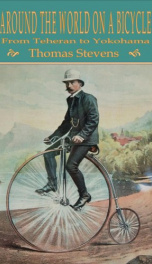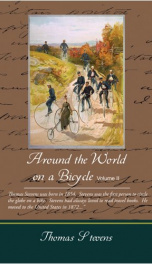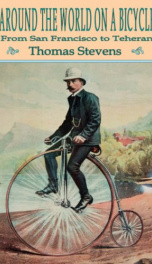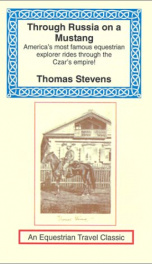Stevens Thomas

Thomas Stevens (December 24, 1854, Berkhamsted, Hertfordshire, England - January 24, 1935) was the first person to circle the globe by bicycle. Born to William and Ann Stevens, with an older sister Bridget and younger Jane, he became a voracious reader of travel literature and in 1872 Stevens left his parents' home and moved to the United States where he held a number of assorted jobs before becoming a miner in Colorado. In 1884 he acquired a black-enameled Columbia 50-inch Standard model penny-farthing with nickel-plated wheels built by the Pope Manufacturing Company of Chicago. Stevens struck out across the country, carrying in his handlebar bag: socks, a spare shirt, a raincoat that doubled as tent and bedroll, and a 38 Smith & Wesson. Leaving San Francisco at 8 o'clock on April 22, 1884, he traveled eastward towards the United States. He was greeted by bicycle clubs, most prominently the local chapter of the League of American Wheelmen in Laramie, Wyoming. He reached Boston after 3700 miles on wagon trails, railroad ways, canal towpaths and public roads, to complete the first transcontinental bicycle ride on August 4, 1884. As reported in Harper's: "Eighty-three and a half days of actual travel and twenty days stoppage for wet weather, etc., made one hundred and three and a half days occupied in reaching Boston." Passing the winter in New York, Stevens contributed sketches of his transcontinental trip to Outing Magazine. The Magazine made him a "Special Correspondent" and sent him on April 9, 1885 aboard the steamer The City of Chicago to Liverpool where he was again greeted by bicycle fans. He continued his journey around the world through England, France, Germany, Austria, Hungary (where he picked up a temporary cycling companion with whom he shared no language), Slavonia, Serbia, Bulgaria, Rumelia, Turkey. In Constantinople he rested among people who had heard of America, refitted with spare spokes, tires and other high technology parts and a better pistol, waited for reports of banditry to subside, and then pedalled off through Anatolia, Armenia, Kurdistan, Iraq and Iran, where he waited out the winter in Teheran as a guest of the Shah. Having been refused permission to travel through Siberia, he set off on March 10, 1886 through Afghanistan where he was expelled by local authorities. He took a Russian steamer across the Caspian to Baku; rail to Batoum; steamer to Constantinople and India. In the Red Sea his knowledge of mules was useful to the British Army. He bicycled across India, noting that the weather was always hot and the Grand Trunk Road was excellent wheeling and free from bandits. Much of his description of life in India, however, suffers from being based on the opinions of experts rather than his own observations. Another steamer brought him from Calcutta to Hong Kong and southern China. He pedalled to eastern China, encountering great difficulty in asking directions in a language he couldn't pronounce. A Chinese official gave him refuge from rioters who were angry over a war with the French. From the coast he took a steamer to Japan, where he delighted in the calm of that country. The bicycle part of his journey around the world ends December 17, 1886, at Yokohama. His itinerary accounts "DISTANCE ACTUALLY WHEELED, ABOUT 13,500 MILES". Stevens returned by steamer to San Francisco, in January, 1887. Stevens' travels through Japan were reported in the Jijishinpou newspaper. Along the way, Stevens sent a series of letters to Harper's magazine detailing his experiences and later collected those experiences into a two-volume book, Around the World on a Bicycle currently available in a single-volume paperback and publicly available at a number of digital library projects. The Pope Company preserved Stevens's bicycle until World War II, when it was donated to a scrap drive to support the war effort. Thomas Stevens is buried at St Marylebone Cemetery in East Finchley, London. His publications also include:
do you like this author?
What readers are saying
What do you think? Write your own comment on this book!
write a commentWhat readers are saying
What do you think? Write your own comment on this author!
write a commentBook list

Around the World on a Bicycle - Volume II
From Teheran To Yokohama
Series:
Unknown
Year:
Unknown
Raiting:
5/5
Show more
add to favoritesadd In favorites

Around the World on a Bicycle - Volume 1
From San Francisco to Teheran
Series:
Unknown
Year:
Unknown
Raiting:
3.5/5
Show more
add to favoritesadd In favorites
Book list

Around the World on a Bicycle - Volume II
From Teheran To Yokohama
Series:
Unknown
Year:
Unknown
Raiting:
5/5
Show more
add to favoritesadd In favorites

Around the World on a Bicycle - Volume 1
From San Francisco to Teheran
Series:
Unknown
Year:
Unknown
Raiting:
3.5/5
Show more
add to favoritesadd In favorites

around the world on a bicycle volume 2
Series:
Unknown
Year:
Unknown
Raiting:
3.5/5
This book is the second volume of the series of books that belong to the pen of a famous journalist who traveled the whole world riding his bicycle. He traveled from San Francisco to Boston, from England to the Balkans, from Turkey to Afghanistan, India, China and Japan. The book was published for the first time in 1902 while Thomas Stevens started his traveling in 1884. The book is full of wonderful impressions, descriptions of the places he visited, people and animals he saw. It is definitely recommended to all readers who want to know more about the life of the world at the end of the nineteenth century.
Show more
add to favoritesadd In favorites

Around the World on a Bicycle - Volume II
Series:
Unknown
Year:
Unknown
Raiting:
1.5/5
Thomas Stevens was born in 1854. Stevens was the first person to circle the globe on a bike. Stevens had always loved to read travel books. He moved to the United States in 1872. In 1884 he left San Francisco on a black-enameled Columbia 50-inch Standard model penny-farthing with nickel-plated wheels built by the Pope Manufacturing Company of Chicago. The bike got its name from the English coins a penny and a farthing. The two coins put together resemble the size of the two wheels of the bike. He rode 3700 miles visiting bike clubs on the way. He ended his journey in Boston. He then boarded a steamer bound for Liverpool where he continued his journey across Europe and Asia. The letters he sent to Harper’s magazine have been complied into a two volume set.
Show more
add to favoritesadd In favorites

Around the World on a Bicycle - Volume 1
Series:
Unknown
Year:
Unknown
Raiting:
0.5/5
A classic account of the Victorian journalist who set off on his bicycle around the world. The final part, Volume 2, From Teheran to Yokohama, is also available on ISBN 978-1847780409.
Show more
add to favoritesadd In favorites
What readers are saying
What do you think? Write your own comment on this author!
write a commentif you like Stevens Thomas try:
readers also enjoyed
What readers are saying
What do you think? Write your own comment on this author!
write a commentGenre
if you like Stevens Thomas try:
readers also enjoyed
Do you want to read a book that interests you? It’s EASY!
Create an account and send a request for reading to other users on the Webpage of the book!


